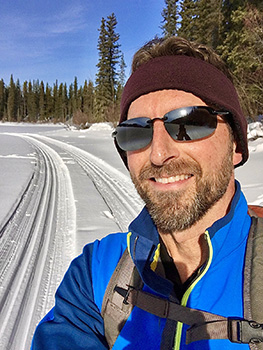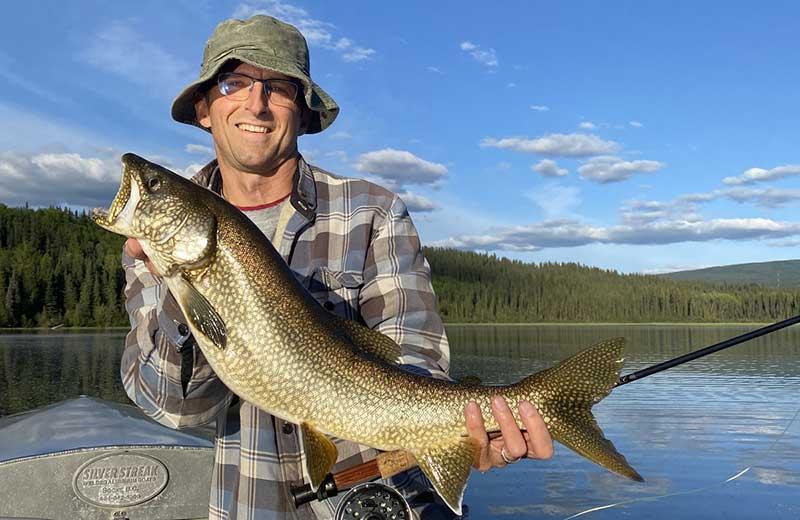To say Dr. David Beaulieu is “well-traveled” may be an understatement. He’s worked in India, the South Pacific, Davis Inlet in Newfoundland and Labrador and more. After his time in Davis Inlet, Dr. Beaulieu worked in some of the most remote communities in Nunavut, and the Northwest Territories. After this, he returned to BC to join the Rural General Practitioner Locum Program (RGPLP), which led him to his work in remote areas of Northern BC. He currently shares his time between Victoria and Dease Lake. Dr. Beaulieu’s travels have given him a unique view of health care systems and rural and remote care.
“Seeing inequity and what life is like without medical care – treating all things, straight from zero – I find bringing quality care to Inuit and First Nation Communities rewarding,” says Dr. Beaulieu. “I get to know patients’ family and friend situations, long-standing issues, and their home environment, ensuring the best care options for their lifestyle.”
An integral part of work in Dease Lake is the relationship Dr. Beaulieu has built with the Tahltan First Nation. He considers it a privilege to work with the Tahltan First Nation, and describes them as “a people proud of their heritage and closely tied to their traditional lands.” Dr. Beaulieu goes on to assert his enjoyment of talking with the Elders, who he characterizes as having “a quiet wisdom and kindness as well as having an excellent sense of humour!"
Dr. Beaulieu regularly invites and welcomes medical students and new doctors to the area, allowing them the opportunity to learn more about remote, small-town care in a close-knit community.
“[People need to] have a certain degree of pluck to take on a community like this,” says Dr. Beaulieu. “I take students out to give a true view of the area – the medicine and the area, and community, where the local doctor may be it – no paramedics, no team of nurses, limited access to specialized resources.”

Doctors in Dease Lake (and other remote communities) are able to provide a wide range of care for many incidents and ailments: one day, they may be helping someone who was in a car or hunting accident, and the next, they may see patients for routine appointments. Dr. Beaulieu and the other doctors in Dease Lake work hard to get to know their patients and their community, connecting with people in the clinic and chatting over the gas pump or in grocery store aisles. It’s key to Dr. Beaulieu that every person is viewed as important as the next. In communities where non-medical services are in short supply, the local grocer or mechanic, for example, is as valuable as the local doctor.
While travel and long appointments can make for long days, Dr. Beaulieu is quick to say that his days are never boring or troublesome. While the days can be long, in 22 years, they’ve never felt onerous.
Dr. Beaulieu enjoys learning about his patients and being able to help them. He also enjoys working with the Iskut and Telegraph Creek nursing stations, partnerships that have helped him and his colleagues learn more about the area, history, and people.
At least once a week, Dr. Beaulieu or one of his colleagues travels from Dease Lake to Telegraph Creek, another remote community about 110 kilometers to the southwest. The old roads they drive, created during the Cassiar Gold Rush in the 1870s, are crumbling in some areas; rock slides and road wash outs are also common on this well-worn path, which means that the road can shut down several times a year. Over the years, Dr. Beaulieu has stopped to move boulders out of his way so he can help patients.
Dease Lake doesn’t have restaurants, barber shops, or other places where it’s easy to meet to catch up with friends, family, and neighbours. The people of this area must rely on other events to help them to stay in touch with each other, events such as popular outdoor activities like hiking, camping, boating, ATVing, fishing, and hunting. Moose hunting is very important to the local Tahltan First Nation, and this is a time when the community comes together to celebrate and enjoy the season and bounty it brings.
When he’s not busy helping the people of Dease Lake, Telegraph Creek, and other communities in the area, Dr. Beaulieu is an avid fisher. In the height of summer sunshine, he sometimes stays on the lake until after 10 pm, fishing the Arctic- and Pacific-drainage fish unique to the area.
“This is BC's last frontier,” says Dr. Beaulieu. “The wilderness is still quite pure; nature as it's supposed to be. [It’s] some of the most spectacular territory in the province.”
For more stories about our Northern physicians, check out the latest edition of Northern Health's Coming Together magazine.














Comments